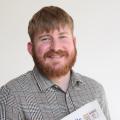
Archaeologists have been going over old ground and digging up the past - but this time it was their own.
The founders of the Norfolk Archaeological Unit met for a 50th anniversary reunion lunch at the end of March at the Ploughshare, a community pub at Beeston near Dereham.
Dr Peter Wade-Martins, who ran the unit as county archaeologist until he retired in 1999 to become the first director of the Norfolk Archaeological Trust, said: “While the re-union brought back many memories, some good and some sad, what this group achieved over the years has really made a difference to our understanding of Norfolk’s past.”
The group formed in 1973 after its members saw damage being done to the county’s archaeology and historical sites and wanted to do something about it.
They used start-up funds from the government to establish Norfolk's first such archaeological unit.

Norfolk County Council took over the running costs of the programme, which allowed the group to develop further, as a wing of the Norfolk Museums Service.
The unit opened an office in the east wing of the old workhouse at Gressenhall, which remained the base for field archaeology until 2019.
Over the years the unit ran many archaeological excavations, including the Norwich Caste Mall Project and at the Spong Hill Anglo-Saxon cemetery, and Iron Age and Anglo-Saxon sites on the path of the Norwich Southern Bypass.
The group also developed a Norfolk Historic Environment Record of historic sites, ran an aerial photography programme which revealed new archaeological sites, encouraged the setting up of metal detecting clubs, and invited metal detectorists to bring their finds to be identified and entered into the county database.

The program was later renamed the NPS Archaeological Unit, and was shut down in May 2021.



Comments: Our rules
We want our comments to be a lively and valuable part of our community - a place where readers can debate and engage with the most important local issues. The ability to comment on our stories is a privilege, not a right, however, and that privilege may be withdrawn if it is abused or misused.
Please report any comments that break our rules.
Read the rules here